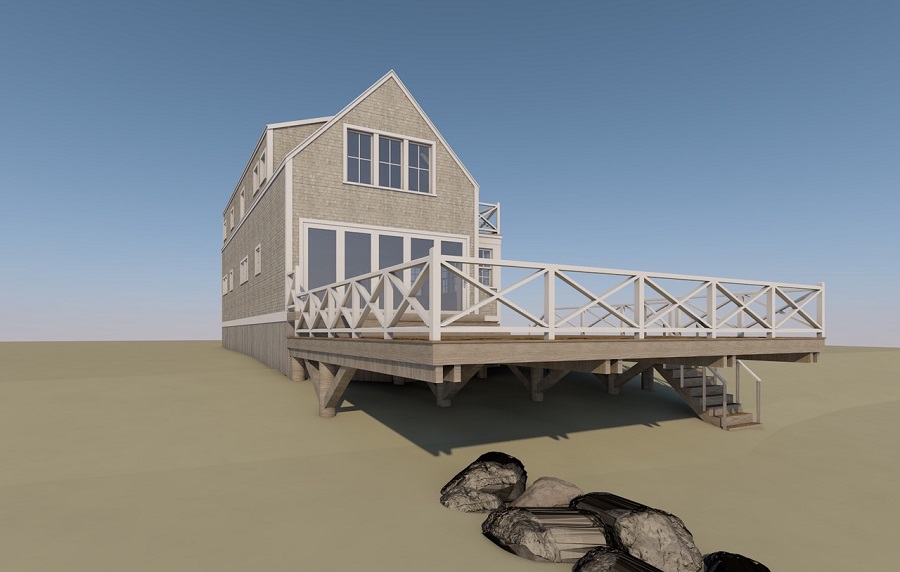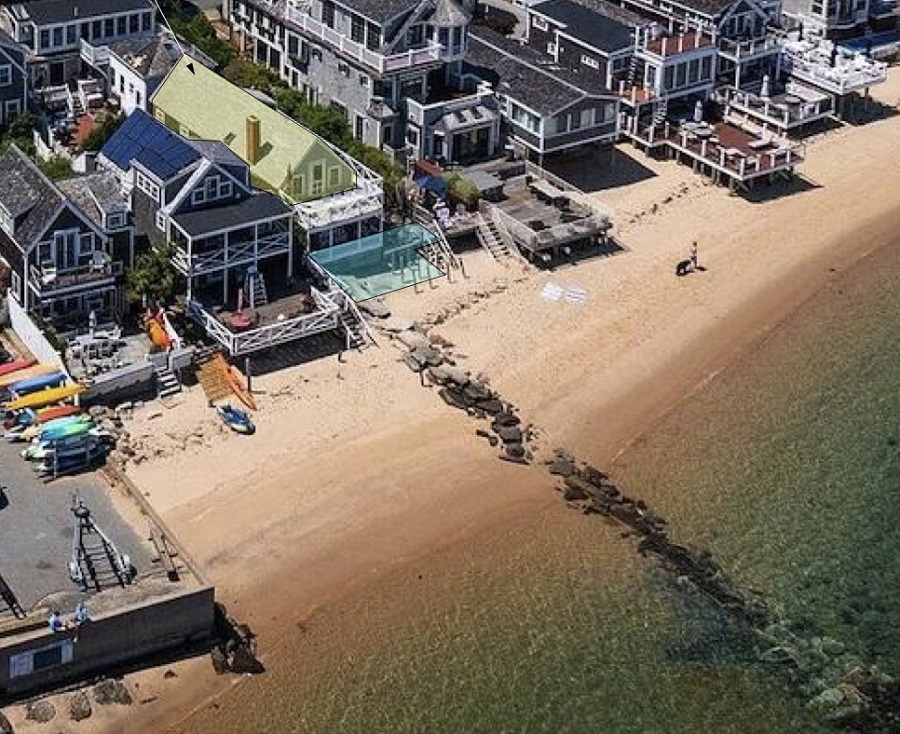This article was updated on Aug. 10.
PROVINCETOWN — Mass. Wetlands Protection Act regulations state that “any project on a coastal beach … shall not have an adverse effect by increasing erosion, decreasing the volume of any such coastal beach or an adjacent or downdrift coastal beach.”
But in the case of a proposed deck expansion that faced pushback from the conservation commission last week, the meaning of “adverse effect” in an age of rising seas proved controversial.
Brennan Bilberry and Tarak Shah bought 61A Commercial St. for $1,995,000 on Nov. 30. The couple’s original renovation plan, by engineer Roy Okurowski, was to rebuild the deteriorating house, which dates to 1880, to current FEMA standards — and expand the footprint of an existing deck by 360 square feet, bringing it almost 16 feet seaward to accommodate an 8-by-20-foot pool.


Commissioners also expressed concern that that additional wood pilings would contribute to beach scouring and erosion. The hearing was continued to Aug. 1, when the applicants returned with a revised plan with no pool and a cantilevered support structure for the deck.
Numerous letters of support from abutters praised the deck design for matching its neighbors and noted the sand accretion and lack of vegetation on that stretch of beach in the West End.
Many of those neighboring decks predate both the state Wetlands Protection Act and the municipal wetlands protection bylaw, according to Conservation Agent Melyssa Millet.
Before the hearing, coastal processes specialist Greg Berman did a site review at Millett’s request. “While there are no dunes currently at the site, if this deck is built, dune vegetation will not be able to grow,” Berman wrote. “This would make the area incapable of allowing a dune to form in the future.
“It is one of the basic tenets of coastal management to adapt to erosion by moving landward if possible. Any expansion seaward is highly unusual and should be very carefully examined by any regulatory body,” Berman added.
Berman told the Independent that “if you’re not going to make it better, at least try not to make it worse.”
Robin Reid, lawyer for the applicants, argued at the Aug. 1 hearing that the commissioners had slim grounds to reject the proposal.
“There are no regulations or terms in the town bylaw which prohibit the creation of shading over a coastal beach above mean high water,” Reid said. “Perhaps more importantly, there is absolutely no evidence of any vegetation growing anywhere along this part of the beach.
“I think the standard you should be judging this application on is the statute, the bylaws, and the regulations, and nowhere do those say you cannot expand seaward,” she added.
The change from piles to a cantilever “does remove the additional threat of erosion and scour on the coastal beach,” Millett said at the hearing. But she disputed Reid’s interpretation of the bylaw. “While shading is not specifically mentioned as a regulation, it is an impact on the coastal beach,” Millett said.
The applicants agreed to half-inch gaps in the deck boards to increase light penetration, but commissioners said they remained uncertain about the effect of the deck expansion, including potential debris.
“A one-time observation of the conditions does not necessarily mean that the conditions won’t change,” Commissioner Mark Adams said.
Section 12-1 of the Provincetown Wetlands Protection Bylaw states that applicants “have the burden of proving by a preponderance of the credible evidence that the work proposed in the permit application will not have unacceptable significant or cumulative effect upon the resource area values protected by this bylaw.”
The parties fundamentally disagreed on whether that standard had been met, and signs of frustration appeared.
“We are vastly improving the reflection of wave energy by raising the house and putting the deck onto the cantilevers,” Reid said. “I think it would be very hard to articulate adverse impacts as a result of this deck.”
Millett, who became Provincetown’s conservation agent in April and before that served as assistant conservation agent in Harwich, said she had never come across a seaward cantilever deck expansion.
Community Development Director Tim Famulare, who served as conservation agent from 2017 to 2022, told the Independent that during his tenure “the only projects that involved seaward expansion on the coastal beach were seawall replacement projects in which a new outer wall had to be installed seaward of an existing seawall that was no longer structurally sound.”
At the hearing, Reid said the commission was erroneously exercising a “blanket prohibition” on seaward development. “You need a concrete reason, some adverse effect that you can point to,” she said.
“I think what I’m hearing is that we’re not sure this will not cause adverse impacts,” Millett responded.
Adams suggested thinking on a 30-year time scale — at which point Shah said, “We have asked throughout the entire process for architects and engineers to build this in a way that is resilient and low impact.”
“I know you took the pool out of the plans, but that kind of put us on edge,” said Commissioner Oriana Conklin. “There’s no pools on Commercial Street on the water.”
Reid interjected, accurately, that there are indeed pools on Commercial Street.
“I know there are, but they were built a long, long time ago,” Conklin responded. “What I’ve been trying to say is that we were nervous about what to expect because no one else has presented us with a pool on this waterfront in a very long time.”
Shah was previously chief of staff for the federal Dept. of Energy and led the climate and science team for the Biden-Harris presidential transition. Bilberry is a political strategist who oversaw a 2012 pro-Obama Super PAC and now consults on corporate antitrust and environmental litigation.
Shah and Bilberry sent a statement to the Independent: “We’re thrilled that our West End neighbors have been so welcoming and supportive of our plan to bring a home back to life that is dangerous for neighbors and the beach,” they wrote. “We appreciate the role of the Commission and are hopeful they will consider the project specific evidence we present.” The couple declined to comment further.
At the end of the hearing, a straw poll indicated that three members would vote no, while a fourth preferred to abstain and wait for more information.
Reid withdrew without prejudice the part of the application regarding the deck expansion. But, she said, “I want to be super clear. We’re coming back on this deck.”
Editor’s note: Because of a reporting error, an earlier version of this article, published in print on Aug. 10, inaccurately quoted conservation commission member Oriana Conklin. She said there were no pools on Commercial Street “on the water,” not “underwater.” The exchange with attorney Robin Reid that followed has been added to this article.



